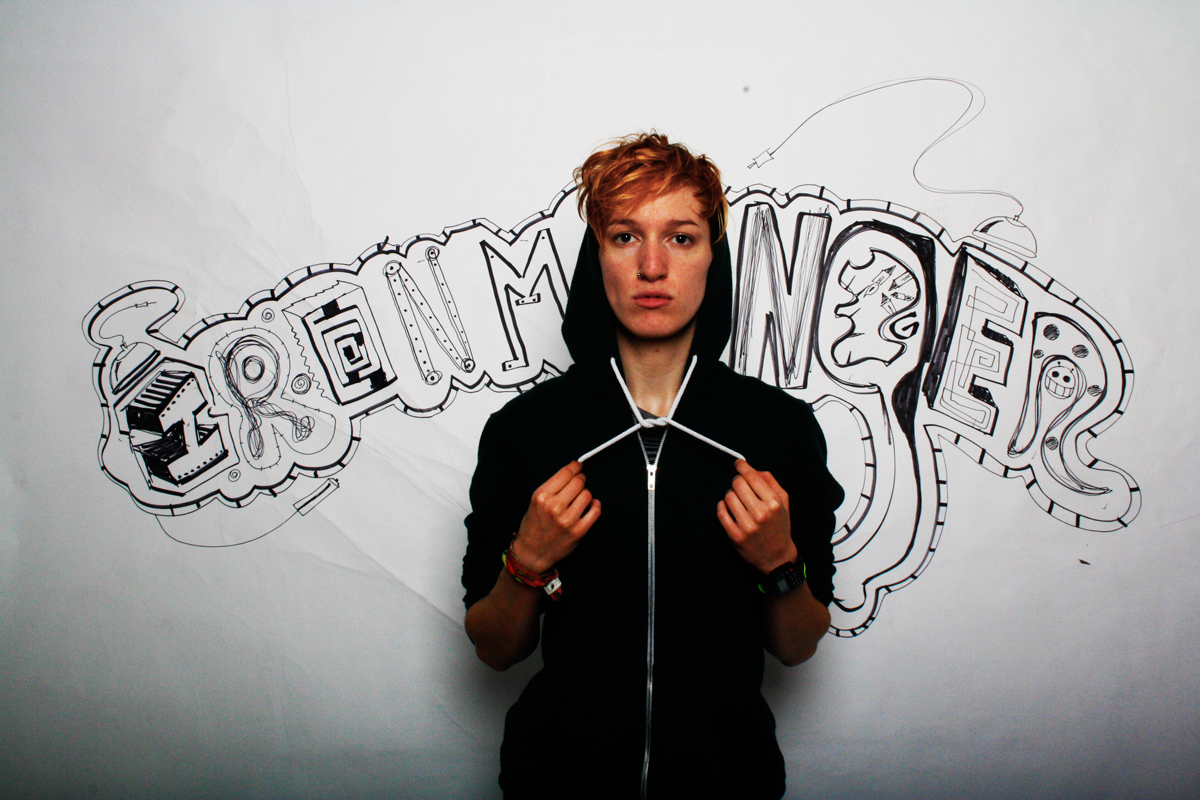Lucy Ironmonger, 26
What do you do and why do you do it?
I’m a resident DJ at Meat Free — we’re four females who run house and techno nights in Manchester, with a leaning towards play-what-you-want resident events, alongside bigger techno events — for example, we’ve got DJ Bone, Fred P and Ben Sims gracing us on 2nd October.
I also teach drum machines (specifically, Native Instruments Maschine) and digital DJing using Traktor, and I’m head course co-ordinator at Manchester Midi School, which is a private school specialising in electronic music production and DJing.
How did you come to live in Manchester?
I relocated from Birmingham after an English with Creative Writing degree; I’d got the electronic music bug badly by second year and was doing a lot of DJing. I then moved to Manchester to study Electronic Music Production and Audio Engineering at Manchester Midi School, where I now work.
What’s the best thing about living in Manchester, and about the creative scene?
People are really friendly I find, and that pervades through to the music scene. People are open to talking music, sharing music, making music together.
Any bad bits?
Homelessness appears to have had a worryingly large rise in Manchester, but I don’t think that’s a Manchester-specific thing — thanks to David Cameron, you wanker. Specifically with Manchester’s music scene, I’d say we need more techno, and more females programmed on line-ups, but we’re getting there, slowly.
Some people say you have to move to London if you want to work in the creative industries. What do you think about that?
I disagree strongly. I believe the holy grail of working in the creative industries is predicated on doing work experience placements and building a strong portfolio, which both rely on you being able to work for free for periods of time, and allowing time to be creative without being paralysed by money worries. If you aren’t privileged enough to be able to live in London and do this, then you do the next best thing, which is seeking out creatives elsewhere. Manchester is a good shout for creatives, and a fraction of the London price.
Is there a North-South divide? And should power be devolved so that Manchester is able to govern itself?
Yes, and yes. I think it’s incredibly important that the most vulnerable in society are given the most opportunity to have their voices heard, and with this in mind devolution is particularly important in poorer areas. London and Westminster, to a lot of the UK, is another world, where the currency is contactless, where you’re a nobody if you didn’t go to private school, where you’ve got to be super-privileged even to to afford rent there. With this in mind, it’s naive to assume Westminster can govern everywhere effectively, primarily because they cannot understand the needs of the vulnerable — you need only look at Cameron’s wave of inhumane austerity measures since the election. This is not to say that I think Manchester should be the ‘powerhouse of the North’, we don’t need a Northern London, we need power to the people (and I believe that’s through power to the councils, and having faith that people will pay more attention to council elections). We need more power away from the South — we need HS2 from East to West, and Manchester to Scotland, we need more wins like Lancashire council saying no to fracking, and more funding into heritage and culture in the North, starting with the People’s History Museum after their malicious funding cuts (good one, Tory scum). We NEED the NHS. I could go on all day…
Give us your top Manchester tip?
Of course it’d be wrong if I didn’t recommend Meat Free — we work hard to push the envelope with our bookings to bring new, experimental sounds to Manchester, and we welcome everyone that’s not a douche on the night (read: come for the music and the good vibes only. Slimeballs, if you’re aiming to sexually harass women or be racist/homophobic/transphobic, you’ll be very quickly out on your ear). For finding a footing in the Manchester music scene I would strongly advise getting yourself to Piccadilly Records, Vinyl Exchange and in particular Eastern Bloc, who put on great artists and pack out St Stevenson’s square regularly. Even if you don’t play vinyl but just go chat to the staff and have a coffee, you’ll soon be pointed to the nights that’ll suit you. Record Store Day in particular, get down for that!
What does the future hold?
For me: working on a Paranoid London-esque acid house thru experimental techno live-set with a 303, Maschine, and Ableton Live combo. For Manchester: at present, we’re seeing a bitter-sweet situation where large warehouse spaces with decent sound-systems are opening such as Mantra Live and Hidden, but in the same breath we see classic venues like the Roadhouse closing, along with Night and Day, and Islington Mill slapped with noise level sanctions. My hope is that new venues opening is an indicative trend of a blossoming underground scene, but my worry is that it’s steeped in a need for venues to be further afield because of council restrictions. Nightlife is really, really important to Manchester’s culture and I’m not sure this isn’t represented effectively in council meetings; let’s hope we see Manchester’s nightlife being supported, and the council being as compliant as possible.
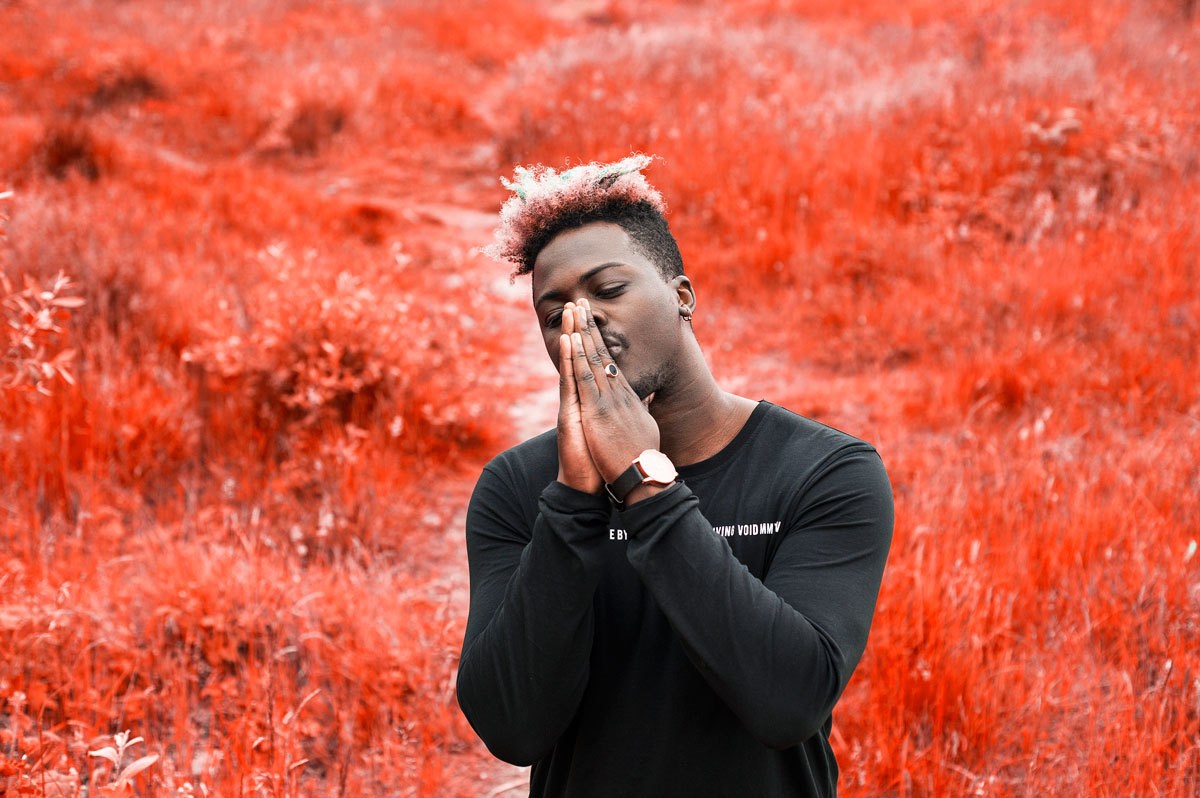
Bipolar Sunshine, older than Miley younger than Kanye
What do you do and why do you do it?
I make music mainly with Jazz Purple 9 (you need to check him out). I’m also involved with a new lifestyle all-round brand called G.R.E.Y, which is going to be rolled out very soon. I do it because I love it.
How did you come to live in Manchester?
My parents moved from Nottingham when I was really young so I have been here most my life. I have seen so much change over the years which is great; I honestly believe that the city is going back to its heyday, when we were a lot more important culturally — shaping people’s perception of popular culture in the UK, I feel we are doing it but from behind the scenes.
What’s the best thing about living in Manchester, and about the creative scene?
It’s that we have a small network of people who know each other. We don’t have many events on that are good but when we do, the right people in the city come and make it special. The scene is evolving right now and building up to be something that is making more people wanna come and stay longer in the city. We have loads of dope illegal raves which I prefer to be in; and Park Life festival, The Warehouse Project, Witch Cunt, Love Dose, MVSON Collective and G.R.E.Y nights, and loads more things that are adding to the scene to make it fresh again.
Some people say you have to move to London if you want to work in the creative industries. What do you think about that?
It depends on exactly what you wanna do. In some cases, I feel like London is full, with everyone looking in the same space for creativity, so things can feel stale; but when you’re in Manchester, it’s like, if you get any attention it’s because you’re doing something that is outside the London box. A lot of the bigger companies are all based in London though, so it’s a double-edged sword sometimes, as there isn’t as much work in Manchester to satisfy a creative person to stay here forever.
Is there a North-South divide? And should power be devolved so that Manchester is able to govern itself?
You could say it’s a divide, but we just do what we have always done and that’s just to get on with it and make dope art. Yeah, we should be able to govern ourselves instead of people waiting for London to make the first move creatively and then follow. That has never been in our culture, but I feel too many people from Manchester listen and watch London too much — they should do their own thing and stop watching.
Give us your top Manchester tip?
It has to be all my team and squad, who I know are doing dope things in the city. You need to check out @thejazzpurple @stewing @masonscollective @fromvirginiaben @qq_gibbs @simeonseen @kamdj_ @sampyatt @zennicus @acidwears @no_face_agency @gaika yeah that’s most of them 🙂
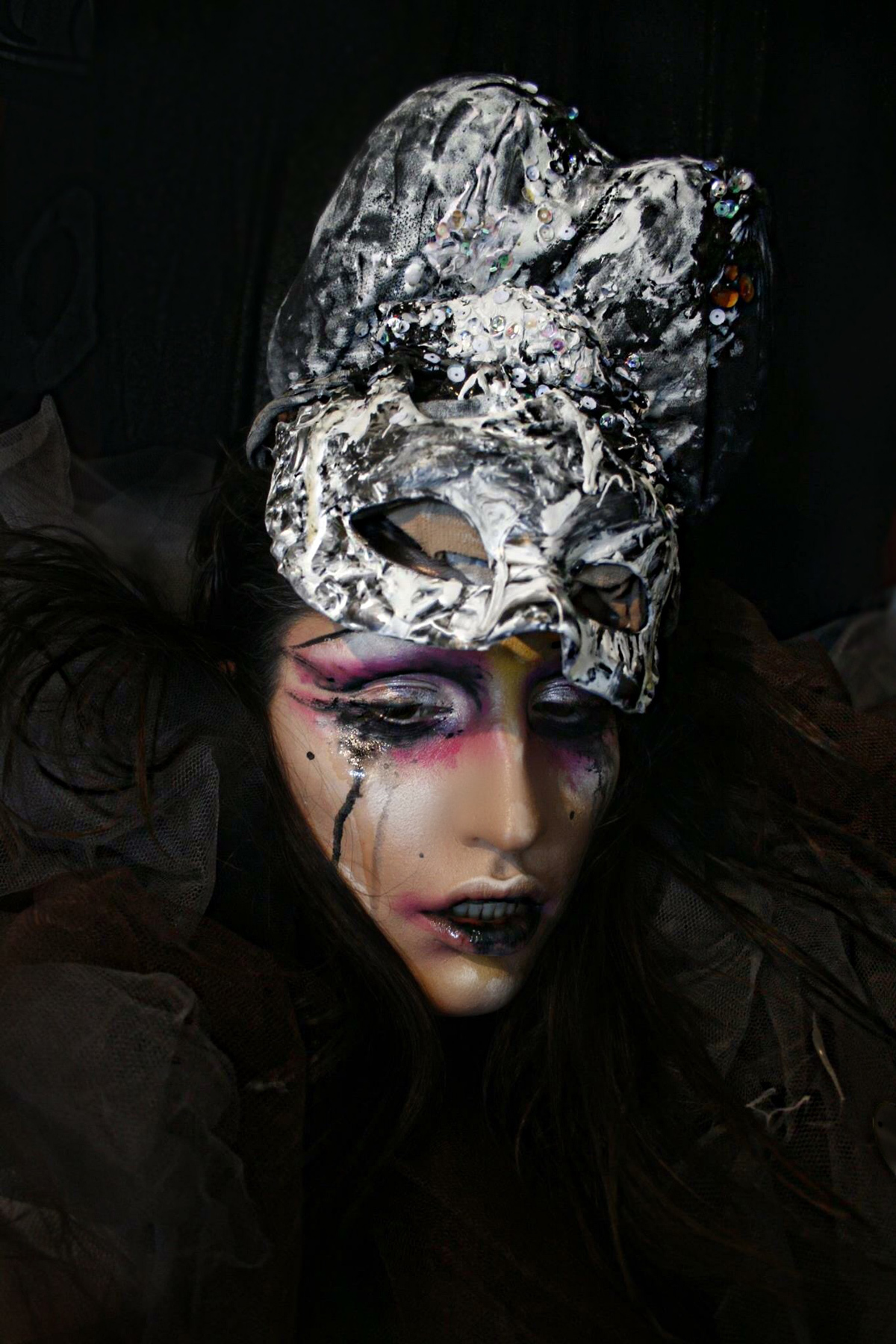
Grace Oni Smith, 26
What do you do and why do you do it?
I am a make-up artist, performance artist, DJ and club ornament in Manchester. I work for MAC Cosmetics and also teach at a make-up academy by day, and by night I work predominantly in clubs but also host and perform at art exhibitions and festivals like the Manchester International Festival, which I am throwing the opening party for along with my drag sisters and my club night Drunk at Vogue. I love performing and working in clubs as it is an outlet for everything I love in life: music, fashion, make-up, theatre.
How did you come to live in Manchester?
I moved to Manchester from London nearly five years ago now and I originally headed up here as I was just looking for a better quality of life. London was becoming more and more expensive and I wasn’t enjoying the rat race any more so I decided to move up north. My brother lived in Manchester at the time and I wanted to be closer to family. I am so glad I made the move and have never regretted it for a second. I am so happy to be part of creating the amazing scene we have here now.
What’s the best thing about living in Manchester, and about the creative scene?
There are so many reasons to love Manchester! Everyone has a big sense of humour up here. No one takes themselves too seriously, which is so refreshing. The queer scene in Manchester is incredible. There is so much diversity; from Canal St to the queer alternative scene, you are spoiled for choice. I am so proud of what we have in Manchester and am very proud to be part of building a thriving queer alternative scene with so many fierce club nights and events.
Some people say you have to move to London if you want to work in the creative industries. What do you think about that?
I don’t agree. I moved out of London to work in the creative industries. When the recession hit, London took a beating. No one had any money, especially the young people and students who put on the fierce nights, and in my field only the independently wealthy MUAs were getting the jobs as there was next-to-no money in it at all. Manchester has a thriving creative scene and with Media City and the BBC being located in Manchester now there have never been more opportunities. People can afford to be creative and express themselves in Manchester more, as the cost of living is a lot less and you can pretty much walk everywhere. Everyone is so much more connected here and I think that is one of the main reasons we have such a flourishing scene.
Is there a North-South divide? And should power be devolved so that Manchester is able to govern itself?
I think there is a north-south division. Poverty is much more of an issue up north but I feel like the cost of living is a lot lower in Manchester, which allows for a better environment for creativity to flourish. I think that the power should be devolved so that Manchester can govern itself. Manchester and London are very different cities and have very different needs.
Give us your top Manchester tip?
Add / follow these people on social media and you will know everything you need to know about Manchester queer nightlife: Violet Blonde, Cheddar Gorgeous, Anna Phylactic, Liquorice Black, Lil’ Queen and, of course, Grace Oni Smith.
What does the future hold?
Manchester is such a fun place to be and is constantly evolving. We have worked so hard to create platforms and safe spaces for queer people to express themselves and have fun and now the next generation of drag queens, artists and performers are starting to put on their own nights and events. I look forward to seeing Manchester explode with even more colour and creativity. As always I have loads of projects on the go but I am especially excited about a new trans/genderqueer cabaret I am working on with my close friend and fellow trans performer Kate O’Donnell, called Get Lippy!
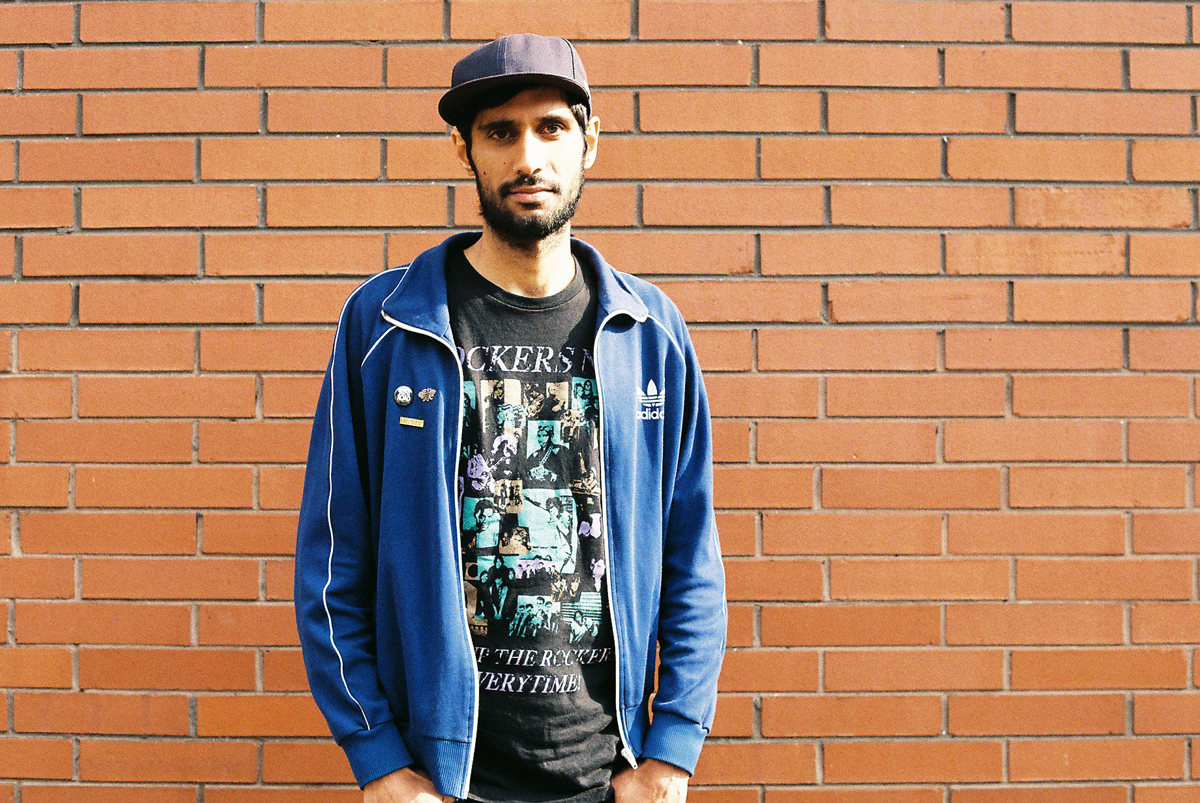
Balraj Samrai, 27
What do you do and why do you do it?
DJ, produce and co-run Swing Ting, a club night, production outfit and record label based in Manchester. Soundsystem-influenced with a heavy emphasis on good vibes and inclusion.
How did you come to live in Manchester?
I had visited and loved the vibes. People were straight up and had great taste in music. Subsequently I chose to study in Manchester and have lived here for nearly a decade.
What’s the best thing about living in Manchester, and about the creative scene?
It’s a big city but a tight-knit village with people supporting, advising and backing each other, especially in music circles.
Any bad bits?
It doesn’t get as much arts funding as it should.
Some people say you have to move to London if you want to work in the creative industries. What do you think about that?
There are different industries that are suited to different professions. There are plenty of opportunities in Manchester, but you may have to persist and dig deep to carve out your own niche. Many creatives are migrating North due to the rent rocketing in the capital.
Is there a North-South divide? And should power be devolved so that Manchester is able to govern itself?
I have a healthy connection to the South, with a strong musical family all over the UK and beyond. In the past there has been a divide but I feel it’s improved in recent times with people understanding and appreciating the North has a lot to offer that can complement the South. Devolution could be amazing for the city but the people need to also have a say in what decisions are being made, as opposed to the council calling all the shots.
Give us your top Manchester tip?
It’s a Friday or Saturday around 5pm. Play basketball in Hulme Park, eat dinner at Kim by the Sea, head out to check one of the residents play at Soup Kitchen before heading to a club of your choice, a few ideas: Hoya:Hoya / Islington Mill / a dance at the Big Western or a show/club at Band on the Wall.
What does the future hold?
Physical and mental space to be creative (hopefully rent will stay lowish and the cuts will be minimal) and not feeling suppressed and stifled to conform to norms.
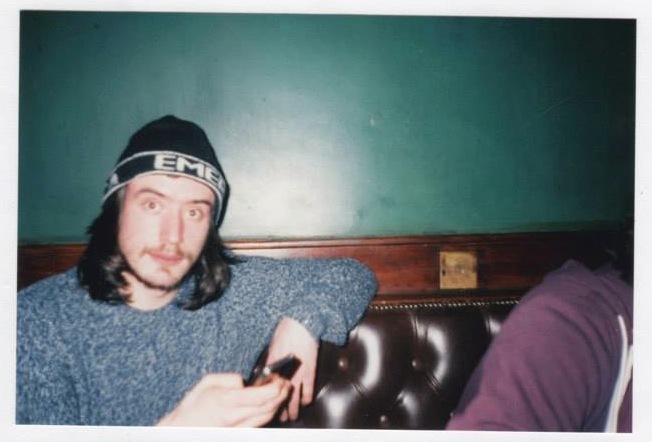
Will Berry, 24
What do you do and why do you do it?
I am co-founder of Generic Greeting Collective, an arts collective I formed with three friends in 2010 so we could support each other’s work and collaborate. Now we have expanded to 25 members in the collective with illustrators, designers, filmmakers, DJs, producers, photographers, animators, writers and more. We not only encourage each other’s work but are also always looking at opportunities to collaborate with each other and create new work together. We’ve worked on exhibitions of all kinds of art work from illustration to multimedia installations; made award-winning short films and music videos; put out four compilations of music and run a monthly mix series; put on club nights and gigs; appeared at festivals and run print workshops and designed wall murals. I’m also a freelance graphic designer and illustrator. I love what I do because it enables me to create and collaborate.
How did you come to live in Manchester?
I moved to Manchester in 2009 to study Graphic Design at the University of Salford.
What’s the best thing about living in Manchester, and about the creative scene?
The best thing about living in Manchester is the ever-growing creative community. The city is a perfect place to be able to meet other like-minded people who are always ready to collaborate and start working on projects together.
Any bad bits?
Getting smelly magic buses to my studio is the only thing I can think of, apart from the rain nine months of the year. But you get used to it.
Some people say you have to move to London if you want to work in the creative industries. What do you think about that?
I think if you believe that you will believe anything.
Is there a North-South divide? And should power be devolved so that Manchester is able to govern itself?
There is definitely a divide and they will always be different. But as things are growing quickly and Manchester is receiving more creative jobs and global coverage it will certainly become a new home for creatives in the UK. Of course power should be devolved and I would love Manchester to govern itself. It’s much more left-wing than London, so it could be better. But I don’t trust George Osborne and the Tories’ method of doing it.
Give us your top Manchester tip?
In the daytime, check out the exhibitions at Whitworth Art gallery. Tea/coffee at Takk or North Tea Power in the Northern Quarter (these places also have exhibitions up on the walls). Monthly club nights to check out are Chow Down and High Bank at Soup Kitchen.
What does the future hold?
I’m going to keep working hard and loving what I do. Generic Greeting Collective will continue to grow and create art projects, collaborations, events, exhibitions, workshops, skill shares and more.
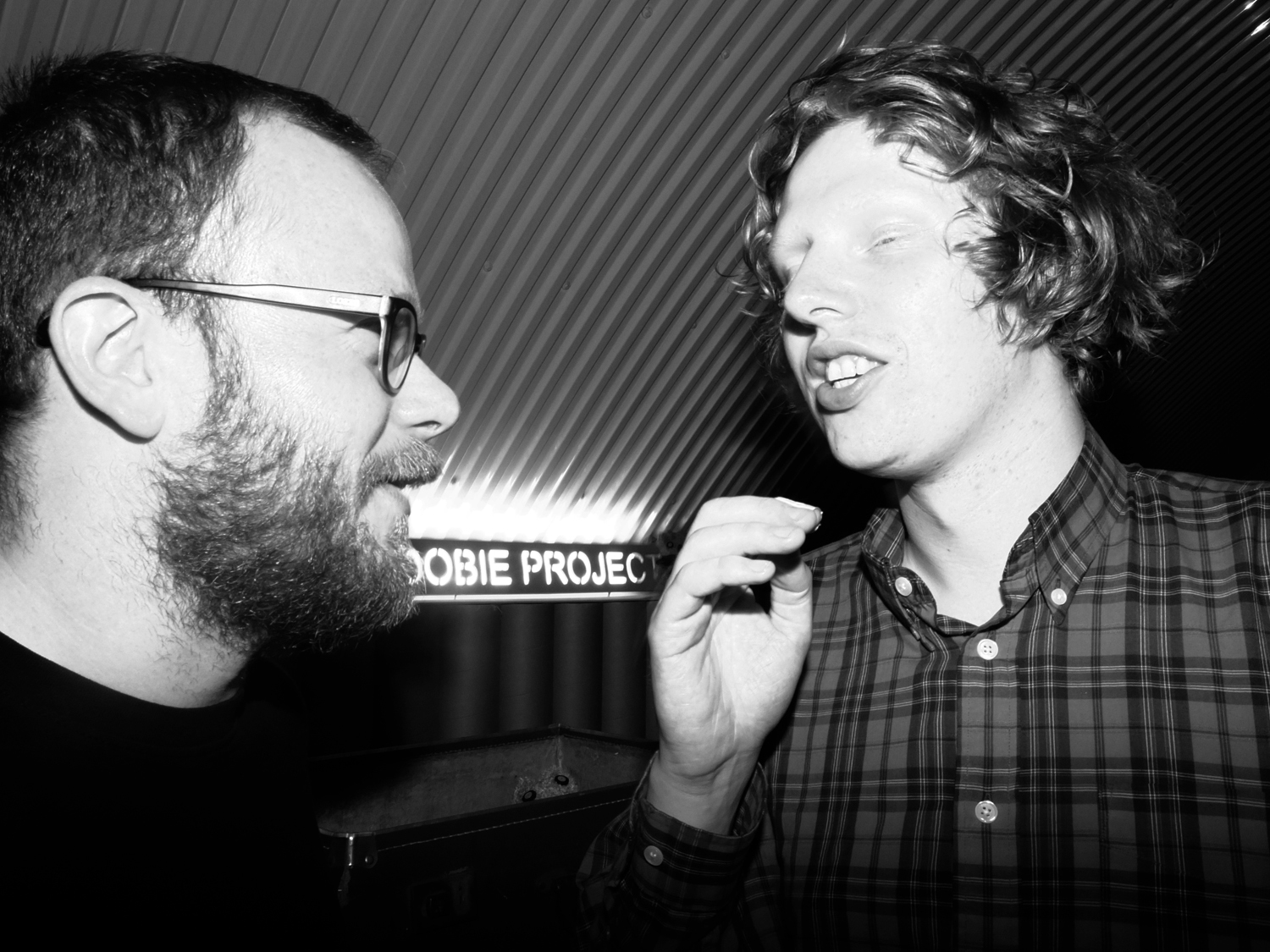
Adam Murray, 32 and Robert Parkinson, 28
What do you do and why do you do it?
RP: Resident DJ at Soup Kitchen and Common. Not long finished my MA in Photography at MMU. Work at Whitworth Art Gallery and a coffee shop and work on my own projects. Get a little bored doing one thing, like to keep my fingers in many (Greggs) pies.
AM: Lecturer in Fashion Communication at LJMU and work on projects. Lecturing seems to be what I’m good at and enjoy, working on other projects makes me a better lecturer.
We’ve worked together for six years as Preston is my Paris, a project rooted in photography with a range of outputs: publications, live events, education, writing. Our most recent release is a photo zine called The North West.
What’s the best thing about living in Manchester, and about the creative scene?
RP: Manchester is a real thriving city. Lots of new interesting spaces popping up for galleries and club nights and that. We’re in the middle of experiencing a large boost in the creative scenes, which is great. Geographically we’re so close to other cities as well, Liverpool, Leeds and Sheffield etc. The best thing about Manchester is it has a community feel, whether I’m working at a café in Cheetham Hill, the Whitworth, or while DJing, you can always find a great conversation.
AM: It’s in the North. It’s not London.
Any bad bits?
AM: The infrastructure for early career practitioners to stay and work in the city, particularly fashion based. The cliches and myths that people in and out of the city rely on.
RP: The art scene is obviously a lot smaller than London which isn’t a problem. It just leaves itself open to too much positive feedback. If you do anything it is almost always seen as amazing by your peers. Some people have been churning out the same work year after year and never get criticised. We all need this discourse to progress in anything creative.
Some people say you have to move to London if you want to work in the creative industries. What do you think about that?
AM: I / we seem to have made it work, but I’m saying that from the point of view of having a decent job soon out of uni. Working with students, I can understand the temptation to go to London. Give it a chance in the North and develop your practice where it’s cheap to be for a few years. The more people move here or stay here, the more likely it is that the infrastructure will develop.
RP: I think it is almost impossible to survive while working in the creative industries in London if you aren’t from an affluent background. The wages you get paid (if any) and the ridiculous rise in accommodation just isn’t feasible if you aren’t already established.
Is there a North-South divide? And should power be devolved so that Manchester is able to govern itself?
AM: There’s more of a UK / London divide than North / South. I imagine it feels just as distant if not more so for people living in Plymouth or Derry/Londonderry or Aberdeen. The concept of political devolution is appealing, but there’s always the danger it will be similar people just running stuff from a different building without reflecting the diverse population, issues and potential of each region. I’d like to see more media devolved regionally so that people with editorial power can be embedded in different culture — get an i-D North office set up!!
Give us your top Manchester tip?
AM: Caustic Coastal and Artists’ Books Special Collection at MMU
RP: Michael Holland of ONO records is releasing a load of interesting and forward thinking recordings. One of which is Tom Boogizm’s latest release. I co-designed the sleeve for this release with Michael and we also did the poster for Tom’s ongoing night Pariahs. These two are the top notch DJs in Manchester alongside Jon K. Never know what they are going to play, whether it be Jungle, Brazilian, Psych, or Post Punk. They keep you guessing and your feet moving.
What does the future hold?
AM: Personally, I’m working on a new project with Lou Stoppard for SHOWstudio about the North of England and editing a book about Preston Bus Station with Jamie Hawkesworth. Generally, hopefully more creative media outlets will remember that London only makes up for 12.5% of the UK population.
RP: Been pretty active on hosting workshops for various institutes. Aiming to focus more on the older generation for these in public libraries such as the Special Collections, which seem to be dominated by students at the moment. Further than that, I’ve got a few photography projects in the pipeline.
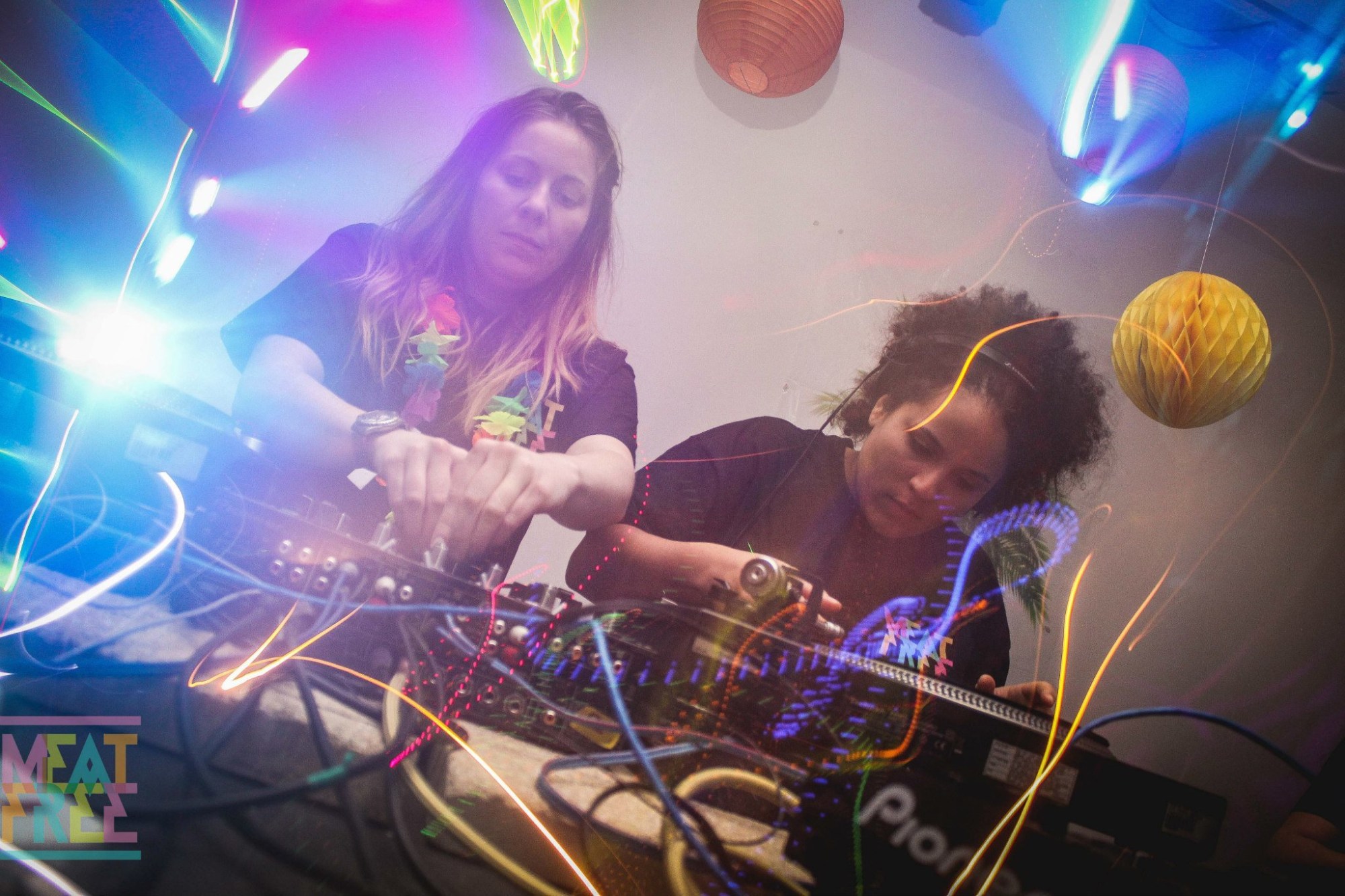
Blasha & Allatt (Natasha Carter and Steffi Allatt), both 27
What do you do and why do you do it?
We’ve both been DJing together as Blasha & Allatt for the last three years and have recently started producing together. We are also resident djs/promoters for our own night Meat Free, which we run with two other girls. Initially, we started DJing for fun, but that soon progressed into a bit of an obsession that has seen us take things a lot more seriously, which then led on to us curating our own events.
How did you come to live in Manchester?
We both come from small towns (Scarborough and Cannock) where the music scene is pretty much non-existent, so were looking for a place to fill that gap and both settled on Manchester.
What’s the best thing about living in Manchester, and about the creative scene?
The best thing has to be that Manchester has a lovely — albeit small — community of house and techno promoters who are are very supportive of each other and very committed to bringing quality underground artists to the city despite the ever increasing costs of putting on events. Due to the fact that the scene is so small you will always bump into someone you know, there definitely seems to be a core group of people that show their continual support to the various nights.
Any bad bits?
One of the most frustrating things is when you see a really good line-up that should do really well and it doesn’t — being promoters ourselves, we know how demoralising it can be to lose money because without that money you can’t keep putting on events.
Some people say you have to move to London if you want to work in the creative industries. What do you think about that?
As neither of us have actually lived in London, we can’t talk from experience, however we’d guess that it would be a pretty difficult place for creativity to flourish; the cost of living is crazy… if you’re spending most of your time working to cover your bills, then when have you got time to be creative? On the other hand Berlin is a place that does allow creativity to flourish; rent and cost of living is generally very cheap which means you don’t have to work as much and can therefore commit more time to your art.
Is there a North-South divide? And should power be devolved so that Manchester is able to govern itself?
Yes, there is definitely a North-South divide, however this isn’t necessarily a bad thing — people naturally align themselves with the lifestyle most suited to them. And as for Manchester governing itself, yes why not: Bez’s Reality Party for the win!
Give us your top Manchester tip?
Recently, a couple of new spaces have opened that have given Manchester a breath of fresh air. Firstly, Mantra Live in Ancoats opened 1 May this year and we were lucky enough to have Meat Free do the opening event with Xosar playing a live set. Secondly, after a long two years of hard graft the guys behind Hidden finally got licensing from Manchester council; this space was made for throwing parties!
What does the future hold?
For us, locking ourselves away and making as much music as possible is first on the list! As for Meat Free, we want to continue to build on what we’ve done so far, we have some great line-ups coming up in 2015: this Friday 3rd July we have Voiski playing a live set for us at Soup Kitchen, 2nd October we will be hosting a two room takeover of Hidden with DJ Bone, Ben Sims and Fred P, then later on in the year we have Jeroen Search (31st October) and Steffi (27th November).
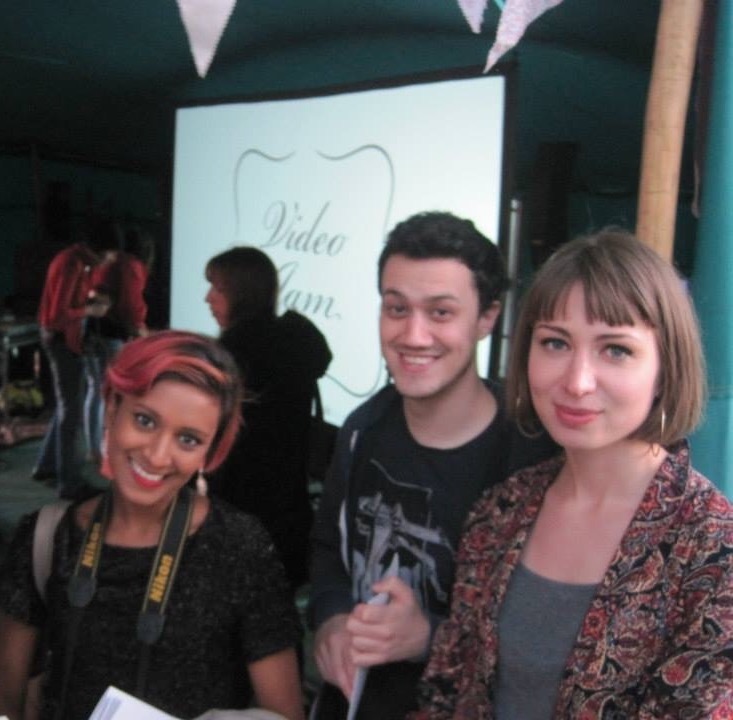
Paul Evans, 26, Shereen Perera, 25 and Sarah Hill, 25
What do you do and why do you do it?
SP: We’re a mix of emerging curators, producers and artists. As our event Video Jam develops, so do our individual practice and skills. We do what we do to support local artists and to hopefully add something of value to Manchester’s cultural life.
What’s the best thing about living in Manchester, and about the creative scene?
SP: Has to be the energy and open mindedness. Collaboration is everywhere. Manchester has a history of taking risks, by nature we’re a fearless city. Best thing has to be Islington Mill, a contagious place full of inspiring individuals. It’s where Video Jam really kicked off and we always return there.
SH: It’s a culturally rich but affordable major city to live in. It’s small enough to feel that you can be very much a part of the DIY art scene and make your mark. And the people are friendly.
Any bad bits?
PE: It’s hard to complain if I’m honest. There are so many great things going on with music, film, art, theatre. It’s a shame there is more of a spotlight on established organisations rather than the various smaller scenes all around the city. If I could change one thing I’d like to see more money being distributed to these different areas. I think there is a fear of failure when investing in less tested projects, when the opposite should be encouraged. If you play it safe all the time then when will you ever achieve something truly extraordinary?
Some people say you have to move to London if you want to work in the creative industries. What do you think about that?
PE: I don’t agree.I stay in Manchester because Tony Wilson is the inspiration for everything I do. After going to Cambridge University, he didn’t move ‘up’ to London. This was back before any regeneration had taken place. He came back and invested a lot of his time and energy into a place that had formed him as a human being. If you are inspired by where you are from, it doesn’t matter if it’s easier to move, you would just be giving up on your identity and the reasons you do what you do. So yes, while it may be tougher up here, we do it because we love Manchester.
Is there a North-South divide? And should power be devolved so that Manchester is able to govern itself?
SP: Yes there is a divide — that’s inevitable, surely? All year round, Manchester brings quality international arts to the city as well as showcasing local artists on a global stage — we’re not trying to compete with London, our offer is very different. I don’t think there is a comparison with London. If anything I think Manchester has more affinity with Berlin, New York, Rio! Investment in the arts has been at the very heart of Manchester’s much celebrated regeneration.
Truthfully I’m not sure whether power should be devolved. As Manchester looks ahead to the possibility of devolution, it’s important to ask what effect this will have in the arts in the UK; can a country that’s increasingly regionally divided still be brought together by art? Since the Commonwealth Games, I think the world has taken Manchester much more seriously and our profile is significantly growing. With major funding being given to institutions like HOME, The Factory and The Whitworth, I’m hopeful that Manchester is going to continue to be culturally diverse, brilliant and progressive.
Give us your top Manchester tip?
SP:The festivals. Manchester International Festival! If it’s theatre: Flare Festival, SICK Festival, Queer Contact, 24:7. If it’s music: Sounds From The Other City, Dot to Dot, Shebeen, Manchester Jazz Festival, Parklife. If it’s art: Chorlton Arts Festival, Didsbury Arts Festival, Free For Arts Festival, Manifest, FutureEverything, Asia Triennial. There are so many!
